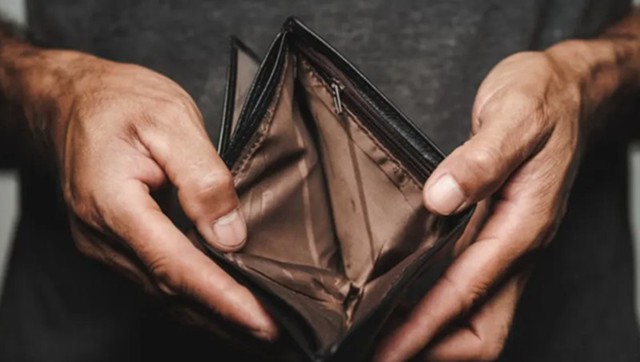Khi một CEO than phiền rằng mức lương 250.000 bảng Anh (khoảng 7,9 tỷ đồng Việt Nam) không đủ tiêu, chúng ta đã phát hiện ra một sự thật đau lòng — người hiện đại phần lớn mắc phải “chứng nhận thức sai lệch về tiền bạc” và đánh giá thấp sự giàu có của mình trung bình 30%!
“Lương năm gần 8 tỷ đồng là thấp sao? Kiếm được từng ấy tiền mà vẫn phải nghèo đến mức ăn đất ư?” sẽ là câu hỏi chung của nhiều người. Đối với hầu hết mọi người, vấn đề này thật quá kỳ lạ — dù sao thì nếu thấy những con số cao như vậy xuất hiện trên bảng lương, chúng ta chắc sẽ cười tít mắt chạy thẳng tới ngân hàng, bởi ít nhất điều đó cũng có nghĩa bạn đã vững vàng bước vào top 1% người có thu nhập cao nhất ở Anh.
Nhưng cựu giám đốc điều hành của một công ty vệ tinh Anh — Frank — lại chính là người kỳ lạ đó. Gần đây, ông đã kiện công ty cũ ra tòa vì cho rằng sau khi công ty tạm dừng việc chi trả tiền thưởng, mức lương “bé nhỏ” sáu con số mỗi năm của ông hoàn toàn không đủ “duy trì cuộc sống”.

Ảnh minh hoạ
Vị CEO này, người đang sống trong một căn biệt thự thiết kế riêng tại Mỹ và một căn nhà nghỉ ở Glasgow, cho biết ông rơi vào tình trạng “hoảng loạn tài chính” sau khi không còn nhận được khoản thưởng thêm 150.000 bảng Anh mỗi năm (khoảng 4,7 tỷ đồng).
Mặc dù thẩm phán đã bác bỏ yêu cầu của ông, nhưng vở hài kịch kỳ quái này lại bóc trần phần nổi của tảng băng mang tên “lo lắng tài chính tập thể” đang đè nặng lên tầng lớp trung lưu hiện đại.
Khi người giàu cảm thấy mình vẫn nghèo
Theo tâm lý học, hiện tượng này là “rối loạn nhận thức tiền bạc” — tức là cảm thấy mình nghèo hơn thực tế.
Và Frank không phải là trường hợp cá biệt. Một nữ doanh nhân sở hữu ba căn nhà, khi nghe cố vấn tài chính nói rằng “tài chính của chị hoàn toàn tự do rồi”, vẫn tuyệt vọng thốt lên: “Tôi cảm thấy mình có thể phá sản bất cứ lúc nào”.
Nữ diễn viên chính của bộ phim nổi tiếng Stranger Things – Millie Bobby Brown – nhận cát-xê 250.000 USD mỗi tập (khoảng 4,6 tỷ đồng), nhưng khi mua kính râm vẫn phải họp cả gia đình để biểu quyết. Cô hài hước than thở: “Chồng tôi thì muốn đi Prada, còn tôi chỉ dám vào siêu thị bình dân.”

Nữ diễn viên Millie Bobby Brown vẫn không thấy mình đủ giàu dù thu nhập cao hơn người thường. Ảnh: The Independent
Nghiên cứu cho thấy, khoảng 70% người có xu hướng đánh giá thấp tình hình tài chính của bản thân. Một phần nguyên nhân đến từ “so sánh xã hội”: chúng ta thường nhìn vào những người có thu nhập cao hơn và dùng tiêu chuẩn sống của họ để áp đặt lên chính mình.
Các nhà tâm lý học chỉ ra rằng: mạng xã hội với làn sóng khoe mẽ không ngừng, cộng với áp lực lạm phát kéo dài, đã tạo nên ảo giác “nghèo tương đối” cho cả những người thu nhập cao.
Giống như đang nhìn qua một tấm gương méo mó — dù số dư tài khoản tăng, bạn vẫn luôn cảm thấy mình thấp kém hơn người khác một bậc.
Ngoài ra, hiệu ứng “kế toán nhận thức” cũng góp phần khiến người ta cảm thấy thiếu thốn: con người có xu hướng đặt ra tiêu chuẩn rất cao cho một số khoản chi nhất định (như trả góp nhà, học phí trường tư), và nếu thu nhập không kịp đáp ứng những “nhu cầu cứng” do chính mình đề ra, họ sẽ cảm thấy khủng hoảng tài chính.
Mạng xã hội và nỗi lo tài chính mù quáng
Dù tài khoản ngân hàng vẫn còn dư dả, cảm giác bất an vẫn bủa vây. Giống như vị giám đốc điều hành nói trên — ông đã quen với lối sống có thưởng cao, nên khi thu nhập không như kỳ vọng, ông lập tức cảm thấy như mình sắp “phá sản”, dù mức lương 250.000 bảng Anh/năm vẫn vượt xa 99% dân số Anh.
Vì vậy, lần tới khi bạn nhìn vào bảng lương và vẫn cảm thấy mình nghèo, hãy nhớ rằng – có thể bộ não đang đùa giỡn với nhận thức của bạn. Bạn nghĩ chỉ người nổi tiếng mới mắc “bệnh than nghèo”? Người bình thường thậm chí còn “đáng sợ” hơn.
Báo cáo nghiên cứu của Ngân hàng HSBC vào tháng 2 cho thấy: người Anh trung bình đánh giá thấp thu nhập của mình tới 30%.
Điều kỳ lạ hơn là: thu nhập càng cao thì càng dễ “mù quáng” — trong nhóm người có thu nhập 100.000 bảng/năm (khoảng 3,15 tỷ đồng), có đến 90% khẳng định họ “không phải người giàu”, dù thực tế mức thu nhập này đã vượt qua 96% người lao động tại Anh.
Độ tuổi cũng ảnh hưởng đến cách con người định nghĩa “an toàn tài chính”: người trẻ cảm thấy cần nhiều tiền hơn để được coi là giàu.
Cụ thể: Nhóm 18–24 tuổi cho rằng cần 343.000 bảng Anh/năm (khoảng 10,8 tỷ đồng) mới “gọi là giàu”; Nhóm 25–34 tuổi đặt mức đó là 324.000 bảng Anh/năm (khoảng 10,2 tỷ đồng).
Trong khi nhóm 35–46 tuổi lại khiêm tốn hơn nhiều, chỉ cần 135.000 bảng Anh/năm (khoảng 4,2 tỷ đồng) là đủ cảm thấy “ổn định tài chính”.
Những con số này phơi bày một thực tế phũ phàng: thế hệ trẻ ngày nay, khi sống trong môi trường mạng xã hội ngập tràn hình ảnh xa hoa, đã bị kéo giãn ngưỡng định nghĩa về sự giàu có một cách mất kiểm soát.
Cuộc khảo sát năm 2024 do tạp chí The New Statesman thực hiện mang màu sắc hài hước đen tối: trong nhóm người có thu nhập từ 80.000–100.000 bảng Anh/năm (khoảng 2,5–3,2 tỷ đồng), có tới 60% người Anh cho rằng thu nhập của họ chỉ “bình thường”.

Lối sống xa hoa có thể khiến chúng ta mất đi sự an toàn về tài chính. Ảnh minh hoạ
Trong khi thực tế, thu nhập trung bình của các hộ gia đình Anh năm 2021 chỉ là 31.400 bảng (khoảng 985 triệu đồng) — tức là những người này đang kiếm gấp 3 lần mức trung bình toàn quốc, mà vẫn cảm thấy mình không giàu!
Tiến sĩ Christine Hargrove, chuyên gia trị liệu tâm lý tài chính, chỉ ra rằng: “Trải nghiệm thời thơ ấu giống như một hệ thống cảnh báo được cài vào não bộ.”
Trường hợp của Millie Bobby Brown là một minh chứng — dù hiện tại là ngôi sao hạng A, cô vẫn thừa nhận: “Tôi lớn lên trong hoàn cảnh nghèo khó, điều đó khiến tôi có rào cản tâm lý khi tiêu tiền.”
Nghiên cứu cho thấy: những người lớn lên trong gia đình khó khăn về tài chính thường mang theo “rối loạn căng thẳng sau chấn thương về tài chính” suốt đời.
Khi lương tăng 10.000 nhưng chi tiêu lại tăng 20.000 đã trở thành “luật ngầm” trong cuộc sống hiện đại. Giáo dục tư thục giờ đây không còn là thứ xa xỉ mà đã trở thành nhu cầu thiết yếu, còn việc thuế và phí tăng đối với căn nhà thứ hai cũng đủ khiến những cặp vợ chồng thu nhập cao phải thở không ra hơi.
Tiến sĩ Hargrove cảnh báo: “Con người thường đánh giá thấp hai loại chi tiêu — chi phí lớn nhưng không thường xuyên (ví dụ: chi phí sửa xe sang đắt gấp ba lần xe thường) và những khoản tiêu nhỏ hằng ngày (các dịch vụ đăng ký như đang gặm nhấm ví tiền từng chút một như kiến tha mồi).”
Chuyên gia của tổ chức tín dụng Courtney Alef nhận xét sắc sảo: “Đối tượng để so sánh của người hiện đại không còn là hàng xóm nữa, mà là những blogger triệu follow trên mạng.”
Số liệu cho thấy: 25% người Mỹ cảm thấy lo lắng về tài chính vì mạng xã hội. Khi bảng tin của bạn đầy những hình ảnh mở hộp túi Hermès, bay máy bay riêng, nghỉ dưỡng xa xỉ, thì dù bạn có thu nhập 50 triệu đồng/tháng, bạn vẫn dễ cảm thấy mình như một “cô gái khu ổ chuột”.
Theo The Independent






